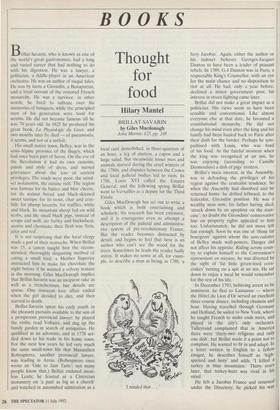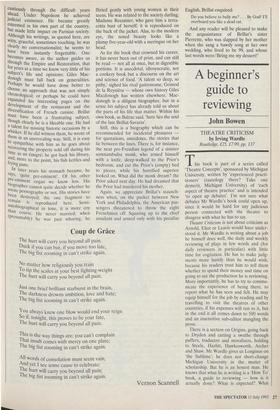BOOKS
Thought for food
Hilary Mantel
BR ILLAT-SAVARIN by Giles Macdonogh John Murray, £25, pp. 248
rillat-Savarin, who is known as one of
the world's great gastronomes, had a long and varied career that had nothing to do with his digestion. He was a lawyer, a politician, a fiddle-player in an American orchestra. He was an author of risque tales. He was by turns a Girondin, a Bonapartist, and a loyal servant of the restored French monarchy. He was a survivor, in other words; he lived to salivate over his memories of banquets, while the principled men of his generation were food for worms. He did not become famous till he was 70 years old. In 1825 he produced his great book, La Physiologie du Gout, and two months later he died — of pneumonia, it seems, and not of a surfeit.
His small native town, Belley, was in the semi-Alpine province of the Bugey, which had once been part of Savoy. On the eve of the Revolution it had its own customs, patois and style of dress, and nursed grievances about the loss of ancient privileges. The roads were poor, the mind- set isolationist, the cuisine rich. The region was famous for its butter and blue cheese, for its walnut bread and black-skinned sweet turnips: for its trout, char and cray- fish: for plump leverets, for truffles, white and black. Its mountain sheep fed on wild herbs, and the small black pigs, instead of scraps and swill, ate barley and buckwheat, acorns and chestnuts; their flesh was 'firm, juicy and red'.
It is not surprising that the local clergy made a god of their stomachs. When Brillat was I.5. a canon taught him the recom- mended, thoroughly disgusting method of eating a small bird; a Mother Superior instructed him to make his chocolate the night before if he wanted a velvety texture in the morning. Giles MacDonogh implies that Brillat-Savarin was an incipient rake as well as a trencherman, but details are sparse. One innocent love affair ended when the girl decided to diet, and then starved to death.
Brillat-Savarin spent his early youth in the pleasant pursuits available to the son of a prosperous provincial lawyer: he played the violin, read Voltaire, and dug up the family garden in search of antiquities. He qualified as an advocate, and in 1778 set- tled down to his trade in his home town. For the next few years he led very much the same small-town life that Maximilian Robespierre, another provincial lawyer, was leading in Arras. (Robespierre once wrote an 'Ode to Jam Tarts': not many people know that.) Brillat endured meat- less Lents; he feasted at a Cistercian monastery on 'a pate as big as a church' and watched in astonished admiration as a local cure demolished, in three-quarters of an hour, a leg of mutton, a capon and a large salad. But meanwhile lesser men and animals starved during the cruel winters of the 1780s, and disputes between the Crown and local judicial bodies led to riots. In 1788, Louis XVI called the Estates General, and the following spring Brillat went to Versailles as a deputy for the Third Estate.
Giles MacDonogh has set out to write a hook which is both entertaining and scholarly; his research has been extensive, and it is courageous even to attempt a description of the judicial and administra- tive system of pre-revolutionary France. But the reader becomes distracted by detail, and begins to feel that here is an author who can't see the wood for the trees. Sometimes he leads the reader badly astray. It makes no sense at all, for exam- ple, to describe a man as being, in 1788, 'a
'I needed that...
fiery Jacobin'. Again, either the author or his indexer believes Georges-Jacques Danton to have been a leader of peasant rebels. In 1789, G-J Danton was in Paris, a respectable King's Counsellor, with an eye for the main chance and no disposition to riot at all. He had, only a year before, declined a minor government post; his interest in street-fighting came later.
Brillat did not make a great impact as a politician. His views seem to have been sensible and conventional. Like almost everyone else at that date, he favoured a constitutional monarchy. He did not change his mind even after the king and his family had been hauled back to Paris after their dash for the border. Perhaps he sym- pathised with Louis, who was fond of his food. At the fateful moment when the king was recognised at an inn, he was enjoying (according to Camille Desmoulins) a dish of pigs' trotters.
Brillat's main interest, in the Assembly, was in defending the privileges of his region against the centralist tendency. So when the Assembly had dissolved and he returned home. he drifted leftward, to the federalist, Girondist position. He was a wealthy man now, his father having died, 'struck down by an apoplexy on the stair- case'; no doubt the Girondists' conservative line on property rights appealed to him too. Unfortunately, he did not move left fast enough. Soon he was one of 'those fat bourgeois' against whom the sans-culottes of Belley made wall-posters. Danger did not affect his appetite. Riding across coun- try to explain himself to the Convention's representant en mission, he was diverted by the sight of 'fat little green-toed corn- crakes' turning on a spit at an inn. He sat down to enjoy a meal he would remember for the rest of his life.
In December 1793, believing arrest to be imminent, he fled to Lausanne — where the Hotel du Lion d'Or served an excellent three-course dinner, including chamois and boar. Having travelled through Germany and Holland, he sailed to New York, where he taught French to make ends meet, and played in the city's only orchestra. Talleyrand complained that in America there were 'thirty-two religions and only one dish', but Brillat made it a point not to complain. He wanted to fit in and adapt. Iii a letter written in English to a fellow émigré, he describes himself as 'high- spirited and lusty' and adds, 'I killed a turkey in blue mountains.' Thirty years later, that turkey-hunt was vivid in his mind.
He left a Jacobin France and returned under the Directory; he picked his way
cautiously through the difficult years ahead. Under Napoleon he achieved Judicial eminence. He became greatly esteemed in his own part of the country, but made little impact on Parisian society. Although his writings, as quoted here, are Witty, graceful, sometimes touching, he was clearly no conversationalist; he seems to have been instantly forgettable. One becomes aware, as the author guides us through the Empire and Restoration, that for years at a time we know very little of his subject's life and opinions; Giles Mae- domigh must fall back on generalities. Perhaps he would have done better to choose an approach that was not simply chronological; or perhaps he could have expanded his interesting pages on the development of the restaurant and the diversification of French cuisine. Brillat must have been a frustrating subject, though clearly he is a likeable one. He had a talent for missing historic occasions by a Whisker. If he did witness them, he wrote of them in an unrevealing way. Still, it is easy to sympathise with him as he goes about recovering the property sold off during his time as an émigré; he got back his library, and, more to the point, his fish kettles and frying pans. In later years his stomach became, he says, 'quite pre-eminent'. Of his other preeminent organ we know less. His biographer cannot quite decide whether he wrote pornography or not. His stories have been . destroyed; the one fragment to remain is reproduced here. Semi- autobiographical in tone, it is more coy than coarse. He never married; when (Presumably) he was past whoring, he
flirted gently with young women in their teens. He was related to the society darling, Madame Recamier, who gave him a terra- cotta bust of herself; it is reproduced on the back of the jacket. Alas, to the modern eye, the noted beauty looks like a plump five-year-old with a meringue on her head.
As for the book that crowned his career, it has never been out of print, and can still be read — not all at once, but in digestible portions. It is anecdotal, idiosyncratic, not a cookery book but a discourse on the art and science of food. 'A talent so deep, so pithy,' sighed his rival gastronome, Grimod de la Reyniere — whose own history Giles Macdonogh has written elsewhere. Mac- donogh is a diligent biographer, but in a sense his subject has already told us about the parts of his life that matter. Within his own book, as Balzac said, 'here lies the soul of the late Brillat-Savarin'.
Still, this is a biography which can be recommended for incidental pleasures — for quotations, anecdotes, the stories that lie between the lines. There is, for instance, the neat pre-Freudian legend of a sinister somnambulist monk, who armed himself with a knife, sleep-walked to the Prior's bedroom, and cut the Prior's (empty) bed to pieces, while his horrified superior looked on. What did the monk dream? the Prior asked next day. He had dreamed that the Prior had murdered his mother.
Again, we appreciate Brillat's staunch- ness when, on the packet between New York and Philadelphia, the American pas- sengers threatened to throw the eight Frenchmen off. Squaring up to the chief assailant and armed only with his peculiar English, Brillat enquired:
Do you believe to bully me? .. . By God! I'll overboard you like a dead cat. -
And any reader will be pleased to make the acquaintance of Brillat's sister Pierrette, who was slapped by her mother when she sang a bawdy song at her own wedding, who lived to be 99, and whose last words were:Tring me my dessert!'



















































 Previous page
Previous page